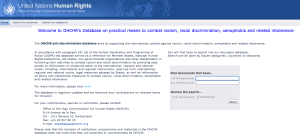
The United Nations Office of the High Commissioner for Human Rights (OHCHR) has launched a new database of information on combatting racism, racial discrimination, xenophobia, and related intolerance. The database includes examples of existing protections and practices used at the regional, national, and international levels, including: treaties, relevant decisions from domestic and supranational courts, texts of legal provisions (e.g., legislation and constitutions), avenues for remedies and redress, policy measures (including National Action Plans containing anti-discrimination measures), and institutional measures (e.g., ministries, working groups, committees). [OHCHR] The information on existing State practices is organized according to the thematic areas identified in the Durban Declaration and Programme of Action.
The database is a compilation of resources from more than 90 countries, and includes over 1,500 documents. [OHCHR] The database is organized to be searchable either by keyword or by category. [OHCHR Database] The searchable categories are: the international level, regional level, national level, existing practices, technical cooperation, or academic studies and other documents. A search by geographic category can be further limited to legal instruments, legislation, awareness-raising programmes or caselaw documents. Those searching for information on existing practices, cooperation or analysis can refine their search by theme or entity. Users can also filter results by country or region of the world. The database additionally provides links to the relevant organization that disseminated the original material and a short summary explaining the content of the resource.
As each country has a different way of combating racism, the database is aimed at helping to bridge the gaps between national and international policies. At the launch event, UN Human Rights Chief Navi Pillay stated that the new database is a “wealth of vital human rights information from all over the world today made accessible to everyone” and she hopes it “will not only encourage the replication of good practices contained in it, but also further empower all stakeholders, including governments, civil society organizations, academia, the media and individual citizens with knowledge on how to fight racism, racial discrimination, xenophobia and related intolerance.” [OHCHR] Having such an extensive research and policy tool will not only encourage good practices, but also assist individual stakeholders in their advocacy.
